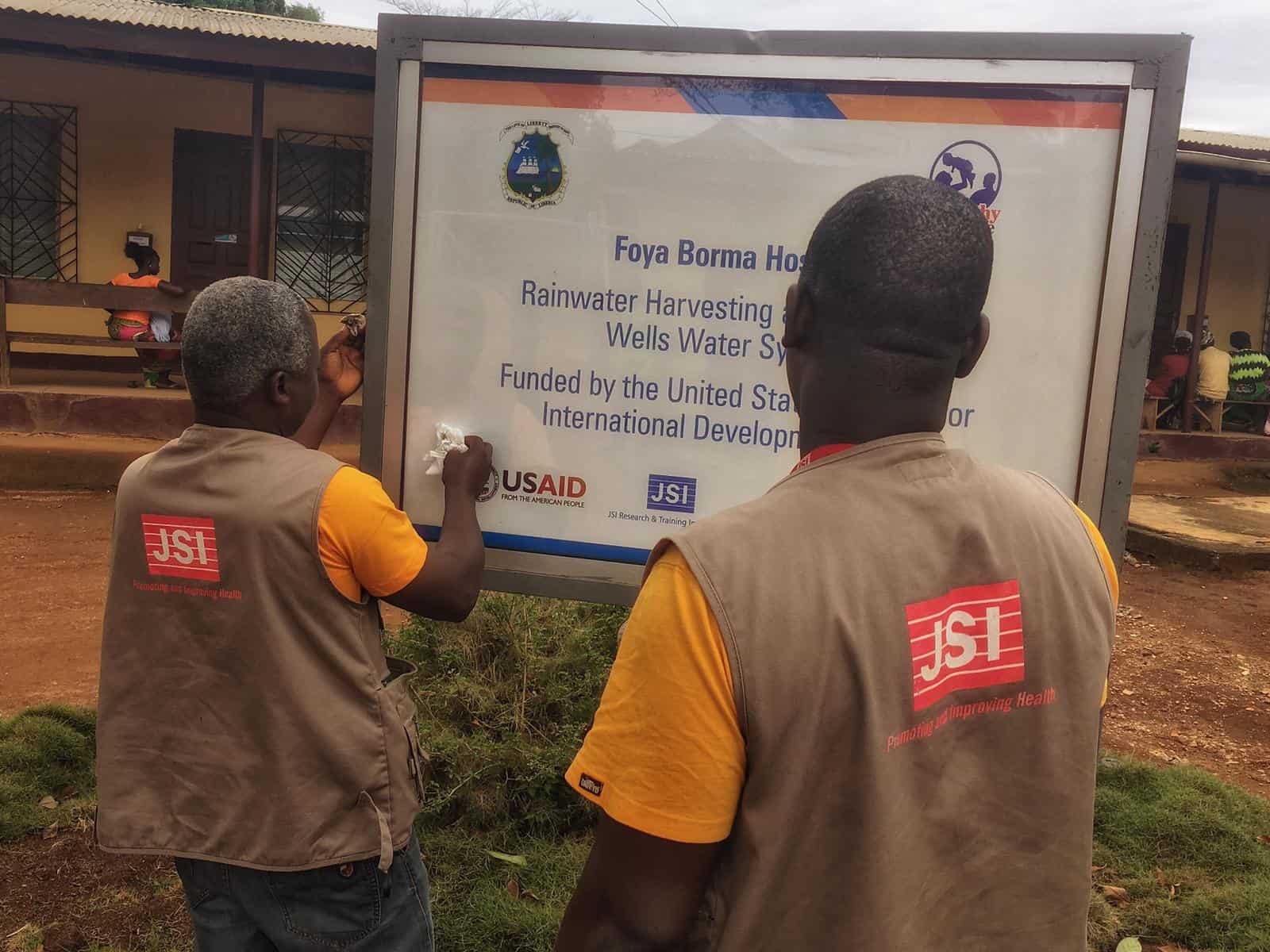USAID Dedicates ‘Rainwater Harvester’ and Wells at Hospitals in Lofa County, Liberia
April 11th, 2019 | news
On Thursday, April 4, the United States Agency for International Development (USAID) dedicated a rainwater harvester and wells constructed to supply water to two hospitals in Lofa County.
The new wells and water storage system, as well as solar panels to provide energy to the wells, are components of the USAID-funded Ebola Transmission Prevention and Survivor Services Program implemented by JSI Research & Training Institute under the USAID Advancing Partners & Communities project, which has been working to strengthen health services across eight counties in Liberia.
Water is a critical component to any health service, in particular for infection prevention and control, as well as maternity care and other health services.
The two hospitals, Foya Borma in Foya and Kolahun in Kolba City, Lofa County, each had trouble accessing water, which became deadly during the 2014-2015 Ebola outbreak, particularly as Foya Borma Hospital was the epicenter of the Ebola outbreak.
With funding from USAID, JSI constructed 295-foot drilled water well, a hand-dug well, and a rainwater harvesting system at Kolahun and Foya Borma hospitals, respectively.

This infrastructure support to these hospitals are in addition to those provided to other health facilities in the counties that were highly affected by the Ebola Virus Disease outbreak (including: JFK Medical Center, Redemption Hospital, Telewoyan Hospital, Dolo Town Health Center).
In her dedication remarks, Laurie Rushton, USAID Health Service Delivery Team Leader, highlighted how very critical water is to healthcare and the prevention of diseases like Ebola and diarrhea.
Ms. Rushton said she is proud of USAID’s support to the initiative and indicated that she is glad that the issue of water for these hospitals has been resolved.
JSI Chief of Party, Dr. Rose Macauley, said that the construction of the rainwater harvesting system and hand-dug wells at Foya Borma Hospital was prompted by the scarcity of water at the hospital.
Built in the 1940s by a group of Swedish Missionaries, the 120-bed Foya Borma Hospital is situated on top of a hill, making access to water difficult.
Dr. Macauley explained that the idea of a rainwater harvesting system emerged after the team initially attempted to dig wells on the hill near the hospital, but twice the engineers were thwarted when huge rocks made digging the wells impossible.
Following the failed attempts, a water harvesting system was suggested to capture rainwater during the rainy season in a large enough tank to get through the dry season.
Foya Borma Hospital Administrator, Thomas Tamba, revealed that the new 90,000-liter tank has served the hospital well this dry season, and there is currently still significant water in the tank. Thus, the tank has proven to hold enough water for the hospital’s needs all year long.
At the Kolahun Hospital, the Medical Director, Dr. Raphael Shamavu, explained that getting water from a river a mile away from the hospital had been laborious and cost intensive.
He said they had six staff assigned to pull water to the hospital using a water-pump and generator, which burnt 24 gallons of gas every week.
Dr. Shamavu expressed thanks to USAID and JSI and said the construction of the 295-foot water well has greatly relieved the hospital.
In a presentation on how they struggled to get water to the hospital, Dr. Shamavu said that with the well, the hospital will save an estimated US$ 42,000 over the next 10 years.
He also disclosed that the six staff members, who had been tasked with ensuring that the hospital get water from the river, have been reassigned and are rendering other services at the hospital.
Speaking at the dedication of the water system at the Kolahun Hospital, Dr. Macauley emphasized that infection prevention and control cannot be done without reliable water supply.
Lofa County Health Officer, Dr. John S. Doedeh, lauded USAID and JSI for the support to the hospitals and promised to ensure the maintenance of the projects.
The district commissioners of Foya and Kolahun in separate statements, assured USAID and the MOH that they would support the hospitals in making sure that the facilities are maintained.
Liberia’s Chief Medical Officer, Dr. Francis Nah Kateh speaking at the dedication of the water systems at both hospitals,thanked USAID and JSI for their continuous support to the healthcare delivery system of Liberia. He further admonished the communities to do everything in their power to maintain these investments.
JSI is a US-based public health research and consulting firm helping to strengthen the health system and improve the quality of health services in Liberia since 2006.
This news item was originally posted on April 9, 2019, on MNews Africa.
We strive to build lasting relationships to produce better health outcomes for all.